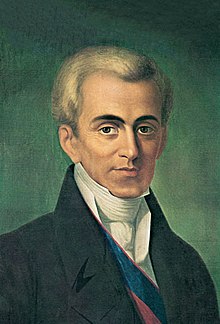Ioannis Kapodistrias
| Ioannis Kapodistrias
Ιωάννης Καποδίστριας | |||
 | |||
| Fødd | 31. januarjul./ 11. februar 1776greg. Kérkyra | ||
|---|---|---|---|
| Død | 27. septemberjul./ 9. oktober 1831greg. Návplio | ||
| Tittel | ambassador of the Russian Empire | ||
| Alle titlar | greve | ||
| Gravstad | Moné Platytéras | ||
| Land | Det russiske imperiet, Hellas | ||
| Far | Antonio Maria Capodistria | ||
| Medlem | Det bayerske vitskapsakademiet | ||
Grev Ioannis Kapodistrias (10. februar 1776–27. september 1831) var ein gresk diplomat og statsmann. Han var den fyrste statsleiaren for det sjølvstendige Hellas, og er rekna som grunnleggjaren av den moderne greske staten[1][2][3][4] og arkitekten bak gresk sjølvstende frå Det osmanske riket. [5] Før dette verka han som utanriksminister for Det russiske tsardømet, og var ein framståande politikar og diplomat i Europa.[6][7][8][9]
Kapodistrias studerte både medisin, filosofi og juss ved Universitetet i Padova i Italia. Då han blei 21 år gammal, i 1797, byrja han den medisinske praksisen sin som doktor. Han var gjennom heile livet sitt ein djupt liberal filosof og ein ekte gresk demokrat. Då han blei president sette Kapodistrias i gang med ei stor reform og moderniseringsprogram som dekte alle område.
Ei av dei mange reformene hans var å undergrava autoriteten til dei tradisjonelle klanane og dynastia. Kapodistrias såg på desse klanane og dynastia for å vera ein del av den ubrukelege arven frå ei gresk fortid som no var forelda. Men han undervurderte den politiske og militære styrken til capetanei (καπεταναίοι, 'kommandørane'), som hadde leia det greske opprøret mot Tyrkia i 1821, og som hadde ei leiarrolle i den post-revolusjonære greske regjeringa.
Han blei skoten og drepen i 1831 av dei politiske motstandarane sine. Desse blei seinare dømde til døden av ein krigsrett og avretta ved skyting.
Kjelder[endre | endre wikiteksten]
- Denne artikkelen bygger på «Ioannis Kapodistrias» frå Wikipedia på bokmål, den 15. oktober 2022.
- ↑ Gerhard Robbers (1 November 2006). Encyclopedia of World Constitutions. Infobase Publishing. s. 351. ISBN 978-0-8160-6078-8. Henta 25 November 2012. «The foundations of the Greek state were built under the leadership of Ioannis Kapodistrias, a statesman of ...»
- ↑ ΕΠΙΤΟΜΟ ΛΕΞΙΚΟ ΤΗΣ ΕΛΛΗΝΙΚΗΣ ΙΣΤΟΡΙΑΣ Arkivert 2009-06-04 ved Wayback Machine. Compound Dictionary of Greek History from the National and Kapodistrian University of Athens Website Quote: 1776 Γεννιέται στην Κέρκυρα ο Ιωάννης Καποδίστριας, γιος του Αντωνίου και της Αδαμαντίνης -το γένος Γονέμη-, μία από τις μεγαλύτερες μορφές της Ευρώπης, διπλωμάτης και πολιτικός, πρώτος κυβερνήτης της Ελλάδας και θεμελιωτής του νεότερου Ελληνικού Κράτους. Έκδοση: ΤΟ ΒΗΜΑ, 2004. Επιμέλεια: Βαγγέλης Δρακόπουλος – Γεωργία Ευθυμίου Translation: 1776 In Corfu is born Ioannis Kapodistrias, son of Antonios and Adamantini – nee Gonemi – one of the greatest personalities of Europe, diplomat and politician, first Governor of Greece and founder of the Modern Greek State. Publisher To Vima 2004.
- ↑ Manos G. Birēs; Márō Kardamítsī-Adámī (2004). Neoclassical Architecture In Greece. Getty Publications. s. 17. ISBN 978-0-89236-775-7. Henta 5 December 2012. «Popular depictions of the leaders of the Greek struggle for independence: Ioannis Kapodistrias, founder of the modern Greek state, and Adamantios Korai's, herald of the Greek Enlightenment.»
- ↑ Council of Europe (1999). Report on the Situation of Urban Archaeology in Europe. Council of Europe. s. 117. ISBN 978-92-871-3671-8. Henta 5 December 2012. «The first legislative enactments dealing with Museums and the preservation of archaeological finds date from the formation of the modern Greek state (1828) and originated with the Governor of Greece, Ioannis Kapodistrias, who issued Order no. 2400/12.5.1828 "To the acting Commissaries in the Aegean Sea", and the Founding Law of 21.10.1829»
- ↑ Woodhouse, Christopher Montague (1973). Capodistria: the founder of Greek independence. Oxford University Press. s. 4–5. OCLC 469359507. «The family of Gonemis or Golemis, which originated in Cyprus, had moved to Crete when Cyprus fell in the 16th century; then to Epirus when Crete fell in the 17th, settling near Argyrokastro in modern Albania; and finally to Corfu.»
- ↑ International Society on the History of Medicine Arkivert 2017-12-16 ved Wayback Machine. Paper: JOHN CAPODISTRIAS (1776–1831): THE EMINENT POLITICIAN-DOCTOR AND FIRST GOVERNOR OF GREECE ISHM 2006, 40th International Congress on the History of Medicine. Quote: "John Capodistrias (1776–1831) was a notable politician-doctor. The son of one of the most aristocratic family of Corfu, he was sent to Italy by his family and studied medicine at the University of Padua." and: Ioannis Kapodistrias was the leading Greek politician and one of the most eminent politicians and diplomats in Europe. He was born in Corfu in 1776. He was son of an aristocratic family whose ascendants had been distinguished in during the Venetian wars against Ottoman Turks, having obtained many administrative privileges (1) (1)=1. Koukkou E. (ELENI KOUKKOU) The Greek State (1830–1832). In: History of the Greek Nation. Ekdotiki Athinon 1975, Vol. XXII: 549–561.
- ↑ William Philip Chapman (1993). Karystos: city-state and country town. Uptown Press. s. 163. Henta 3 August 2012. «Actually, Russia's distinguished diplomat and Foreign Minister, and later Greece's first president (1827-3 1)...»
- ↑ Helenē E. Koukkou (2001). Ioannis A. Kapodistrias: the European diplomat and statesman of the 19th century; Roxanda S. Stourdza : a famous woman of her time : a historical biography. Society for the Study of Greek History. s. 9. ISBN 9789608172067. Henta 3 August 2012. «Kapodistrias distinguished himself in the diplomatic and political arena when he was still a young man...But he too sensed that his Liberal and Republican ideals were too advanced for his time»
- ↑ Charles A. Frazee (1 February 1969). The Orthodox Church and Independent Greece, 1821–1852. CUP Archive. s. 71–72. GGKEY:GTHG6TEJ1AX. Henta 3 August 2012. «...a distinguished career in political and diplomatic affairs...»
